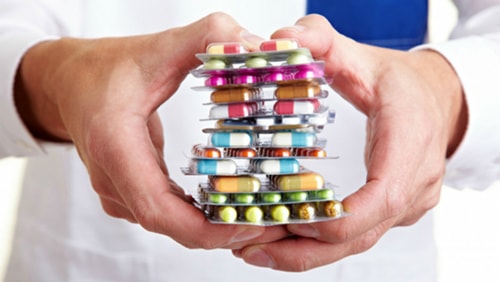6 mistakes when using prescription drugs
Many people buy drugs without checking the label and comparing it with the doctor's prescription, combining drugs with food or drinks incorrectly, such as with grapefruit juice...
According to the US Food and Drug Administration, errors in the use and storage of drugs kill at least one person every day and injure 1.3 million people every year. Below are common mistakes to avoid when taking prescription drugs, according to abcnews.
 |
Value branded drugs over generic drugs
Brand name means trade name. In treatment, the role of the first brand name is very important because all data on effectiveness and safety of human use, animal studies, etc. are from the first brand name. This first brand name is called the original brand name, or simply the original brand name. Generic drugs are drugs that are bioequivalent to the original brand name in terms of pharmacokinetic and pharmacodynamic properties, produced when the industrial property rights of the brand name have expired, so they are often sold at a low price.
Although cheaper, generics are just as effective as brand-name drugs. The only difference is that inactive ingredients, such as dyes or preservatives, do not affect the drug's activity. According to Dr. Kim Russo, Director of Clinical Practice at VUCA Health, a large medical video library service in the US, these minor differences in generics are allowed. We have largely forgotten about it in medicine. If you can't tolerate one of the inactive ingredients, you may need the brand-name drug. Otherwise, save your money and go with the generic.
Combining drugs with food or drinks incorrectly
Always check for foods and drinks that may interact with medications. One food to watch out for is grapefruit and grapefruit juice. There are about 50 medications on the market that can be affected by this food. Depending on the medication, grapefruit juice can decrease or increase absorption (which can lead to overdose). Certain medications should not be taken with calcium-rich foods because they interfere with the body's ability to absorb the medication. Additionally, some medications can cause you to lose or retain potassium, so talk to your doctor about whether you can start or stop eating certain foods while taking your medication. You should also consider drinking alcohol. Alcohol can turn mild side effects into dangerous ones.
Not checking the drug label
To avoid getting the wrong medication, make sure you have the correct prescription before leaving the pharmacy. A different color or shape may mean the medication is from a new generic manufacturer, but it does not mean it is safe.
Do not tell the pharmacist
Most pharmacists will be able to answer any questions you may have about your medication. Don’t rush into choosing a new medication. This is the time to learn what the medication does, its benefits, and any potential side effects or interactions. If you have been taking the medication for a while and have recently experienced unexplained changes, such as a rash or persistent headaches, it’s also a good idea to ask your pharmacist.
Improper drug storage
Medicines should not be stored in places with high humidity such as bathrooms because moisture can damage the medicine. Medicines should also be kept away from light. That is also why medicine bottles are amber in color to block ultraviolet rays.
You should keep your medicines in a dark place, especially if you have a light cabinet where light can penetrate. Some medicines should not be left out of their bottles. Some medicines, such as insulin, may need to be refrigerated but can be warmed up before injection and then stored at room temperature for a number of days as prescribed. Remember that some medicines need to be refrigerated and they may lose their potency if left at room temperature for even a few hours.
Do not throw away old medicine
Most medications are still effective for up to two years after their expiration date. That’s when they should be discarded, but not flushed down the toilet. Flushing some heart, stroke, or hormone medications can be very harmful to the environment. Only a few medications, including painkillers, can be flushed away. Other medications should be placed in a plastic bag and thrown in the trash.
According to VnExpress






